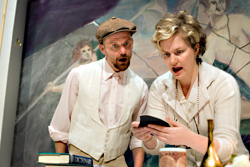With a lot of respect and not a little irreverence and wit, Seattle playwright Scot Augustson has taken aim at the founding mythology of Western culture and—without succumbing to the artless demon of political correctitude—turned classic drama on its head, revealing what’s really under the tunic of Greek paternity. Augustson’s latest, Girls & Gods, or Prometheus Unwed, gives a bighearted yet necessarily vigorous goose to the endemic misogyny of our cultural heritage, enacting a kind of campy, literate table-turning on such heavies as Aeschylus, Homer, Odysseus, and all the Olympian bigwigs and their macho games. No more are the minor-key women of Greek myth tossed out once their wombs have been filled: The gods get their comeuppance at the hands of some extremely self-actualized and pissed-off chicks, taking shots in the chops, nads, and bungs for their raping, pillaging, distaff-disposing ways. What the play lacks in cohesion and narrative drive it more than makes up for with intelligence, originality, and sheer brio.
Directed by local theater veteran Carys Kresny, Girls & Gods is a broad, bawdy, loose-limbed satire whose fun-poking ways are so well-tuned and smartly placed that it becomes a sort of backhanded homage—or, more precisely, a kindly but firm correction that never dislodges the true value of that which it so affectionately upends. We’re not talking small game here: Augustson’s ultimate comic target is no less than that god of (polytheistic) gods Zeus and his rollicking, partying pal Dionysus. His play crisscrosses and blends the present day and Greek yore in a network of doubled characters; at its center is lonely, work-obsessed archaeology professor Hazel (Stacey Plum), whose life is turned upside down when she receives a package containing plaster shards from Greek antiquity from her Uncle Milo (whether Milo actually is her uncle is the source of some good old-fashioned slapstick). Hazel’s doppelgänger Wren appears and, in a fit of subversive brilliance, tricks Zeus and Di into screwing each other, literally. Their resulting mutual pregnancy lands them cloistered in a home for mortal women bearing celestial children. Here the play, already pretty free-ranging, really breaks the bounds of narrative, becoming almost a variety show—think Laugh-In penned by Harold Bloom and Woody Allen, and you might begin to approximate the disjointed energy and comic brashness of Augustson’s work.
The cast is strong. Plum is a good lead, adept at the tics and timing of this sort of comedy, and Madeline Kahn–like in her willingness to engage with the material’s sexual antics and physical pratfalls. Equally impressive is Brandon Simmons, who takes on no fewer than six roles (and some of the quickest costume changes I’ve ever witnessed), moving deftly and convincingly among Death, Poseidon, and a Mexican zookeeper while also playing swain to each of the three women who inhabit the house of god-impregnated mortals where Zeus and Dionysus strut and fret. Allan Armstrong makes a convincingly hapless and frustrated Zeus (it just so happens he also plays the role of Hapless and the priest of Zeus), and Stephen Hando is fantastic as Dionysus; he also plays the unambiguously gay mailman Buster. Alycia Delmore, Peggy Gannon, and Shannon Kipp are good as the pregnant women Amerrigo, Sophie, and Birdie (Kipp also has a nice turn as a starletlike Aphrodite). And playing Prometheus, the enigmatic Uncle Milo, and others is John Wray, a fine actor with a knack for strong characterization. Really, there are no weak links here—which, given the difficulty of much of Augustson’s material, is a testament to the ensemble’s collective talent.
As in so much historically targeted comedy, Augustson seems to have a difficult time wrapping up his narrative’s multiple strands; the finale, climaxing in a ticker-tape parade, is something of a catch-all. This, however, is hardly a strike against such a soulful and wryly funny work. Blow for blow, Augustson’s sharp, sly play delivers more laugh-out-loud moments than most stage comedies. Revenge in this instance is oh, so sweet.








